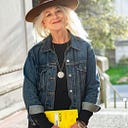Trusting your gut: when timeless wisdom meets neuroscience
“It’s all in your head.”
I remember hearing that phrase as I was growing up, tossed about recklessly as a comment on ailments doctors couldn’t identify. It hit me first when a doctor sent my hard-working mom, whose back pain always got worse when stress rose up at work, home after what I’m sure he thought was an adequate examination. Her hurt was more than physical as she shared what he’d said: “He told me ‘It’s all in your head.’”
Since then, I’ve seen friends deal with things like chronic pain, fatigue disorders, and, in one memorable case, something that turned out to be truly life-threatening, as stress or pain rose in their lives.
Something about those dismissals always struck me as wrong. I knew my mother wasn’t faking the pain she felt, that my friend’s “aching bones” were real enough to hold her back from things she genuinely longed to do. Their experience was real: that was clear. The cause? Did the fact that a physician couldn’t pinpoint it mean that the pain wasn’t real?
My decades-long inquiry into neuroscience, ancient wisdom, and evolutionary biology now leave me curious at how my gut told me something our culture so strongly denied. These disciplines have helped me update my response to that phrase “It’s all in your head.”
That’s because it turns out that our heads have a lot more to do with our health than was acknowledged in my growing-up years. Today, science is rekindling the spark of the mind-body connection—which helped guide our well-being for thousands of years before being discarded by modern science — increasingly finding evidence of a tie between what we feel in our minds and how our body responds.
The American Journal of Psychiatry, Harvard’s Benson-Henry Institute (co-founded by a western MD who pioneered the application of ancient traditional health practices to modern-day cases), even branches of the National Institute of Health: all these and more have substantiated the correlation between “what’s in our head” and “what’s happening in our bodies.”
Understanding the brain is a foundation of this. When we look at the brain as a biological mechanism, one that evolved to help us survive a world very different from the one it ultimately created, we see things in new ways. By understanding the brain’s biological mechanics, we can challenge some of the tendencies it “defaults” to, creating new paths to wellness and even life satisfaction. This understanding, which is quite natural to learn and practice, can help us connect more deeply with the wisdom of our bodies, and of our inner experience, in ways that build resilience, balance, and well-being.
In these times of rising stress, and with the pressures that so many people feel in their work, their personal lives, and with the state of the world, understanding the power of what’s in our heads, and aligning it with the intelligence of our bodies, can be a powerful key to integrated, embodied wellness.
In November this year I’ll explore the “brain” part of wellness, offering a unique, neuroscience-backed perspective on the path to mind-body health. Joining two highly regarded physicians and one of the world’s most respected leaders in embodied health, we’ll lead a groundbreaking exploration of what it really means to be well — and how our minds and bodies can align to support well-being.
We’ll lead this exploration at 1440 Multiversity, an incredible retreat destination in the Santa Cruz Mountains, over the weekend of November 15–17. Surrounded in sumptuous nature and supported by talented, caring practitioners, participants will explore their own power to find the wellness they seek in ways they can return to again and again.
I hope you’ll join me, Deborah Cohan, MD, Alexandra Johnson, MD, and pioneering wellness practicioner Jon Schreiber, DC, at Embodied Medicine: Tools for Conscious Living and Optimal Mind-Body Health this November. We’ll explore a scientific understanding of the mind-body connection and share new practices that help integrate timeless, holistic wellness into all aspects of modern life.
If you are ready to connect mindfully to all that health can mean to you, learn more. I look forward to the rich learning we will share, practice, and build together.
